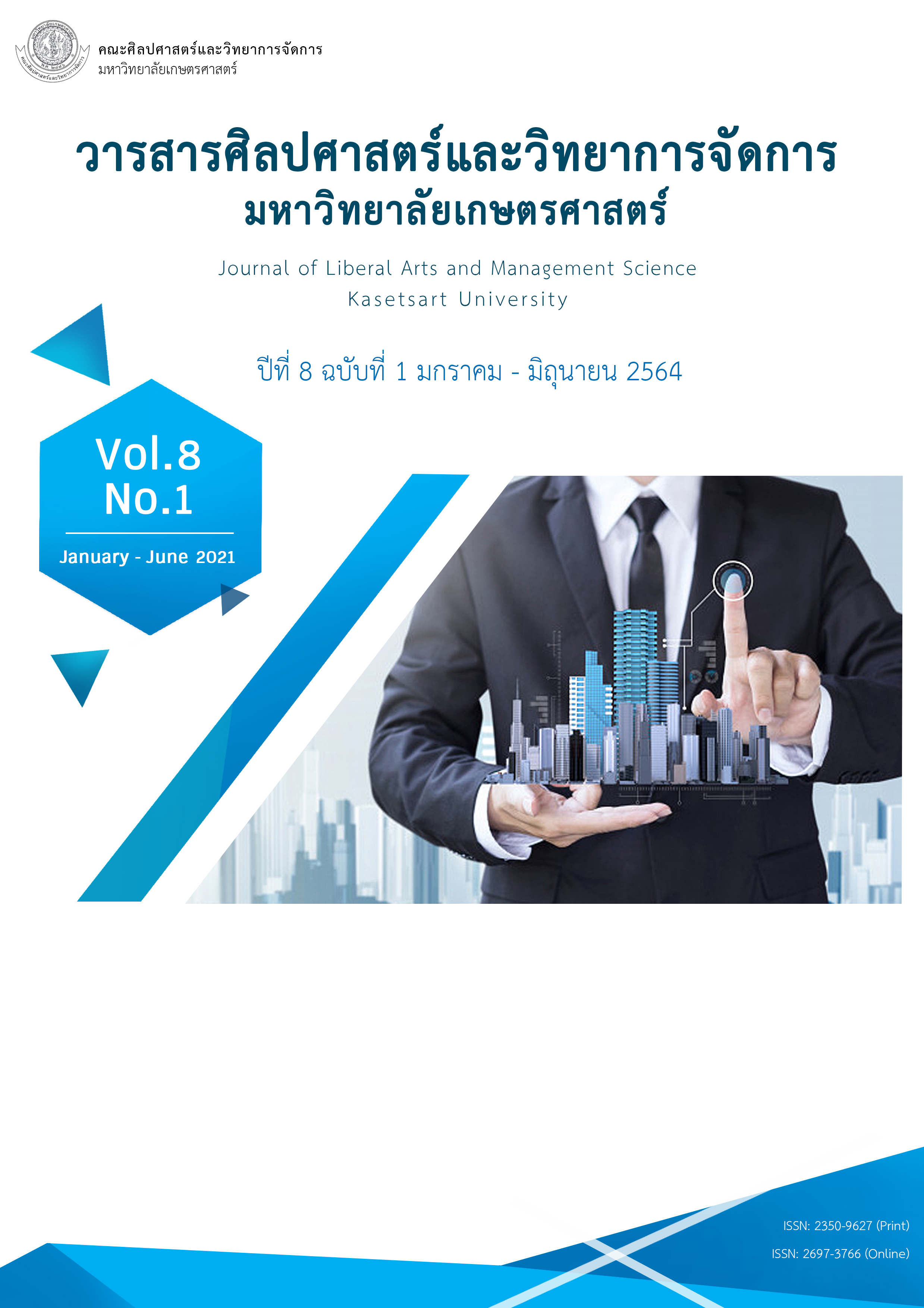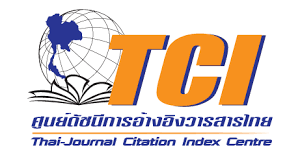หนี้ครัวเรือนไทยกับแนวทางแก้ไขให้ยั่งยืน
คำสำคัญ:
หนี้ครัวเรือน, ปรับปรุงโครงสร้างหนี้, หนี้เสียบทคัดย่อ
ภาวะหนี้สินครัวเรือนของไทยมีแนวโน้มเพิ่มสูงขึ้นอย่างต่อเนื่องในขณะที่ประชาชนกลับมีรายได้และความสามารถในการชำระหนี้ที่ต่ำลง ซึ่งอาจส่งผลกระทบต่อระบบเศรษฐกิจในระดับมหภาคได้ในที่สุด ดังนั้น การแก้ไขปัญหาหนี้ครัวเรือนจึงเป็นประเด็นสำคัญที่ไม่ควรมองข้าม ซึ่งในปัจจุบันพบว่าคนไทยเป็นหนี้เร็วขึ้น เป็นหนี้นานขึ้น และเป็นหนี้มากขึ้น แม้ภาครัฐจะออกมาตรการใดๆ มาเพื่อบรรเทาปัญหาหนี้สินของครัวเรือน เช่น การแก้ไขปัญหาแหล่งเงินทุน การเข้าถึงแหล่งเงินทุน การลดอัตราดอกเบี้ยเงินกู้ แต่ประสิทธิผลของมาตรการเหล่านั้นจะมีน้อยหากครัวเรือนยังคงขาดวินัยทางการเงิน จึงจำเป็นต้องสร้างความรู้ทางการเงินโดยเฉพาะการบริหารหนี้สินครัวเรือน ดังนั้นบทความวิชาการนี้จึงมีวัตถุประสงค์เพื่อขยายความรู้และความเข้าใจเกี่ยวกับสถานการณ์การหนี้ครัวเรือนไทยในปัจจุบัน ปัจจัยที่ก่อให้เกิดหนี้ และเสนอแนวทางแก้ไขปัญหาหนี้สินครัวเรือนอย่างยั่งยืน โดยเนื้อหาประกอบด้วยการวิเคราะห์เอกสารและงานวิจัยที่เกี่ยวข้องพร้อมการยกตัวอย่างการแก้ปัญหาการผิดนัดชำระหนี้เพื่อเป็นแนวทางแก้ไขปัญหาหนี้เสีย โดยหวังว่าบทความนี้จะสามารถเป็นแหล่งข้อมูลแก่ภาคครัวเรือนในการป้องกันวิกฤตหนี้สินและเป็นภูมิคุ้มกันที่ดีต่อครัวเรือนก่อนที่จะเข้าสู่วัฏจักรของการเป็นหนี้ได้ในอนาคต
เอกสารอ้างอิง
ชุติภา คลังจตุรเวช. (2554). ผลกระทบของหนี้ครัวเรือนไทยและวิกฤตเศรษฐกิจของประเทศไทย (วิทยานิพนธ์ปริญญามหาบัณฑิต, จุฬาลงกรณ์มหาวิทยาลัย). กรุงเทพฯ.
ธนาคารแห่งประเทศไทย. (2561). ธนาคารแห่งประเทศไทยกับการแก้ปัญหาหนี้ครัวเรือน. สืบค้นเมื่อ 31 ธันวาคม 2563, จาก https://www.bot.or.th/Thai/ResearchAndPublications/Report/ Pages/AnnualReport2018_box04.aspx
ธนาคารแห่งประเทศไทย. (2563). รายงานการประเมินเสถียรภาพระบบการเงินไทย 2563. สืบค้นเมื่อ 31 ธันวาคม 2563, จาก https://www.bot.or.th/Thai/FinancialInstitutions/Publications/DocLib_FSR2563/FSR2020.pdf
ธนิดา ตันติอาภากุล. (2560). ปัจจัยที่ส่งผลต่อการผิดนัดชำระหนี้สินเชื่ออุปโภคบริโภคของธนาคารพาณิชย์และบริษัทที่ประกอบธุรกิจแต่มิใช่สถาบันการเงินในประเทศไทย. (วิทยานิพนธ์ปริญญามหาบัณฑิต, จุฬาลงกรณ์มหาวิทยาลัย). กรุงเทพฯ.
พรทิพย์ อังศุภมงคล. (2560). ปัจจัยที่มีอิทธิพลต่อการก่อหนี้ของข้าราชการตำรวจในสังกัดสถานีตำรวจภูธรเมืองนครสวรรค์ จังหวัดนครสวรรค์. ใน การประชุมวิชาการระดับชาติครั้งที่ 4 (น. 521-530). สถาบันวิจัย: มหาวิทยาลัยราชภัฏกำแพงเพชร.
พรภัทร อินทรวรพัฒน์, สิรีรัตน์ เชษฐสุมน, และผ่องพรรณ ตรัยมงคลกูล. (2557). ปัจจัยเชิงสาเหตุที่มีอิทธิพลต่อการก่อหนี้สินของนักศึกษา ปริญญาตรีในกรุงเทพมหานคร. วารสารวิทยาสารเกษตรศาสตร์ สาขาสังคมศาสตร์, 35(1), 1-15.
พิชญ์สินี วงษ์กาวิน. (2560). ภาระหนี้สินของข้าราชการตำรวจสังกัดตำรวจภูธรจังหวัดประจวบคีรีขันธ์. วารสารวิชาการคณะมนุษย์ศาสตร์และสังคมศาสตร์, 8(1), 73-85.
ศูนย์วิเคราะห์ TMB Analytics. (2562). บทวิเคราะห์พฤติกรรมการเงิน GEN Y. สืบค้นเมื่อ 31 ธันวาคม 2563, จาก https://www.tmbbank.com/newsroom/news/analytics/view/financial-behavior-GEN-Y.html
ศูนย์วิจัยกสิกรไทย ธนาคารกสิกรไทย. (2563). หนี้ครัวเรือนทรงตัวสูงต่อเนื่องขณะที่โจทย์เฉพาะหน้า คือ เยียวยาลูกหนี้พ้นโควิดรอบใหม่ (มองเศรษฐกิจ ฉบับที่ 3904). สืบค้นเมื่อ 31 ธันวาคม 2563, จาก https://www.kasikornresearch.com/th/analysis/kecon/financial/Pages/Household-debt y3904.aspx.
สรา ชื่นโชคสันต์, สุพริศร์ สุวรรณิก, และธนัชพร สุขสุเมฆ. (2562). หนี้ครัวเรือนไทย: ข้อเท็จจริงที่ได้จาก BOT-Nielsen Household Financial Survey. FOCUSED AND QUICK (FAQ) Issue 143, น. 1-15.
สำนักงานคณะกรรมการพัฒนาการเศรษฐกิจและสังคมแห่งชาติ. (2561). หนี้สินครัวเรือนมีแนวโน้มเพิ่มขึ้นแต่ความสามารถในการชำระหนี้ยังไม่น่ากังวล. สืบค้นเมื่อ 12 พฤศจิกายน 2563, จาก https://www.nesdc.go.th/ewt_w3c/ewt_news.php?nid=8502&filename=.
สุพริศร์ สุวรรณิก. (2561, 2 ตุลาคม). การแก้ปัญหาหนี้ครัวเรือนไทยอย่างยั่งยืนควรเริ่มที่ไหน?. บทวิเคราะห์ทางเศรษฐกิจ ธนาคารแห่งประเทศไทย, น. 1-3.
สุริยะ หาญพิชัย, เฉลิมพล จตุพร, และวสุ สุวรรณวิหคม. (2563). ปัจจัยที่ส่งผลต่อหนี้สินครัวเรือนเกษตรกรในจังหวัดลพบุรี. Journal of Modern Learning Development, 5(5), 309-320.
อุษา อมรรัชยาวิจารณ์. (2560). ปัจจัยที่มีผลต่อการเกิดหนี้นอกระบบของประชาชน ในอำเภอเมืองชุมพร จังหวัดชุมพร. วารสารวิจัยและพัฒนา มหาวิทยาลัยราชภัฏสวนสุนันทา, 9(1), 62-73






